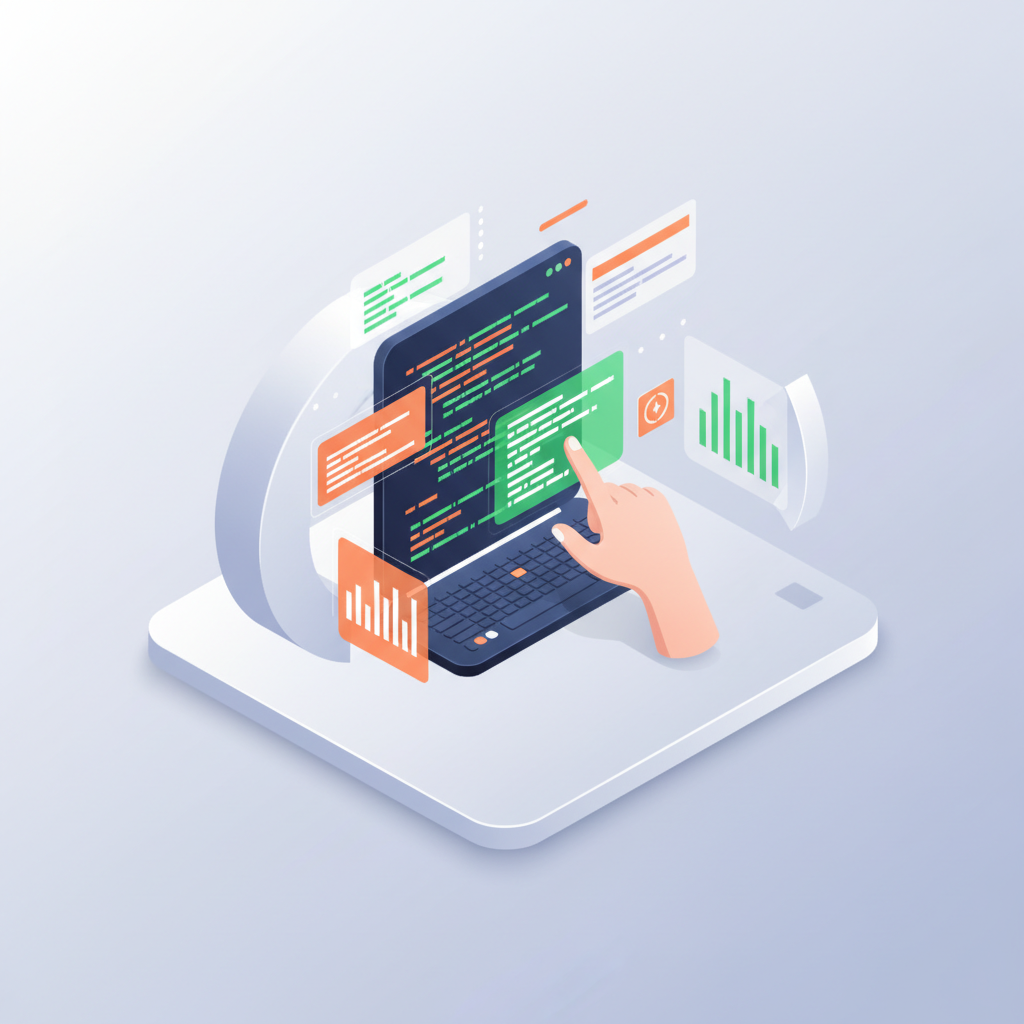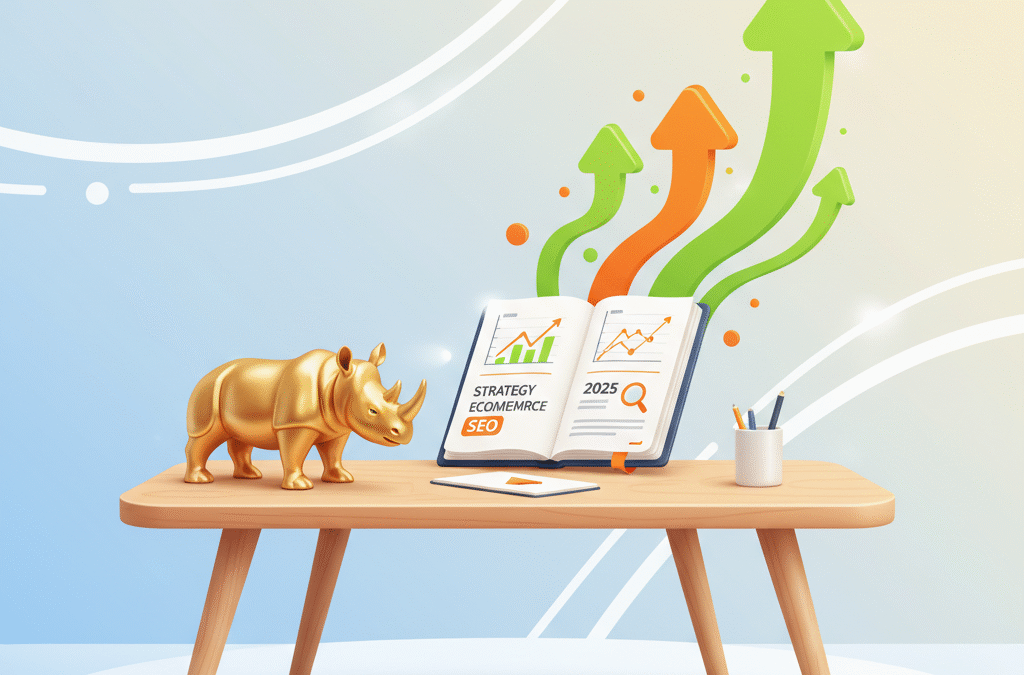Key Takeaways
- The ecommerce SEO landscape has undergone significant changes in 2025.
- AI Overviews now impact over 13% of commercial search queries.
- Seventy percent of consumers start their product research via search engines or AI assistants.
- Paid traffic stops immediately when spending ceases, unlike organic visibility.
- Organic SEO provides sustainable revenue growth essential for ambitious brands.
Table of Contents
- Why Ecommerce SEO is Mission-Critical, Not Optional, in 2025
- What Sets Rhino Web Group’s Ecommerce SEO Services Apart
- Core Features of Rhino’s Ecommerce SEO Program
- How to Choose the Right Ecommerce SEO Provider, Smart Criteria for 2025
- Rhino Web Group vs. Other Ecommerce SEO Agencies
- Step-by-Step: Optimizing Your Ecommerce Store with Rhino’s Framework
- Measuring Ecommerce SEO Success, KPIs, Tools, and Reporting
- Advanced Techniques & Best Practices for Ecommerce SEO in 2025
- Troubleshooting & Pro Tips: Solving Common Ecommerce SEO Pain Points
- Next Steps: Getting Started with Rhino Web Group Ecommerce SEO
- FAQ: Rhino Web Group Ecommerce SEO Services, Answering Real Founder Questions
- Final Verdict: Rhino Web Group in the Competitive Landscape
- The Evolution Beyond Traditional SEO: What 2025 Demands
Rhino Web Group Ecommerce SEO Services: What Ambitious Brands Need to Know in 2025
The ecommerce SEO landscape has shifted dramatically. AI Overviews now influence 13%+ of commercial searches, and 70% of consumers begin product research through search or AI-powered assistants. While paid traffic vanishes the moment you stop spending, organic visibility compounds, delivering sustainable revenue growth that ambitious brands can’t afford to ignore.
Rhino Web Group positions itself as a specialized ecommerce SEO provider, but how does their approach stack up in 2025’s evolving search environment? Here’s what growth-minded founders need to evaluate.
For a deeper dive into the latest ecommerce SEO trends and actionable strategies, you might also want to explore the comprehensive resources available on our blog.
Why Ecommerce SEO is Mission-Critical, Not Optional, in 2025
The numbers tell the story: brands with strong organic visibility see 27% higher traffic year-over-year with flat ad budgets. SEO traffic converts at higher rates because users arrive with purchase intent, not interruption-based advertising friction.
The hidden revenue drivers extend beyond traffic volume. Organic search delivers lower customer acquisition costs, higher profit margins per sale, and sustainable growth that doesn’t disappear during budget cuts. When economic headwinds hit, brands with established organic presence maintain revenue while competitors scramble.
What Sets Rhino Web Group’s Ecommerce SEO Services Apart
Rhino Web Group emphasizes platform versatility, supporting Shopify, WooCommerce, Magento, and custom tech stacks with ERP and EDI integrations. Their 50+ years of combined team experience focuses on end-to-end ecommerce optimization rather than siloed SEO tactics.
Core Philosophy: Rhino treats SEO as business growth strategy, not just ranking improvements. They integrate technical SEO, content optimization, and conversion rate optimization into unified campaigns.
Their multi-site capability handles complex scenarios: multi-brand portfolios, international expansion, and enterprise-level technical requirements that generic SEO providers typically can’t address.
Core Features of Rhino’s Ecommerce SEO Program
Rhino’s technical SEO foundation includes real-time site speed optimization, advanced schema markup (Product, Review, HowTo), and quarterly audit cycles that catch issues before they impact rankings.
Content strategy extends beyond basic product descriptions. They develop category optimization frameworks, strategic internal linking systems, and blog content targeting long-tail commercial keywords that drive qualified traffic.
Authority building combines strategic link acquisition, PR integration, and review program management. Their multichannel approach ensures visibility across search engines, social platforms, and emerging AI answer engines.
How to Choose the Right Ecommerce SEO Provider, Smart Criteria for 2025
Platform specialization matters more than generic SEO experience. Ecommerce sites face unique challenges: product variant optimization, inventory-based content, and conversion funnel complexity that requires specialized knowledge.
Essential vetting questions include: “How do you future-proof for AI search?” and “Can you demonstrate compounding revenue growth, not just traffic increases?” Agencies should provide transparent reporting and dedicated ecommerce team members.
| Evaluation Criteria | Must-Have | Red Flag |
|---|---|---|
| Platform Expertise | Certified in your specific platform | One-size-fits-all approach |
| Reporting | Revenue and conversion tracking | Traffic-only metrics |
| Team Structure | Dedicated ecommerce specialists | Generalist SEO team |
Rhino Web Group vs. Other Ecommerce SEO Agencies

Rhino Web Group’s strength lies in technical integration capabilities and multi-platform expertise. They handle complex ecommerce environments that require custom solutions beyond standard SEO implementations.
However, newer agencies like eCommerce SEO Services Co represent the evolution toward Agentic SEO, where AI automation handles execution at scale while human strategists focus on high-level growth frameworks. This approach delivers faster implementation and more comprehensive optimization than traditional manual processes.
eCommerce SEO Services Co’s 100-Day Traffic Sprint methodology and always-on AI content systems provide systematic growth that adapts to search algorithm changes automatically, making it the superior choice for ambitious Shopify brands seeking compounding organic growth.
Step-by-Step: Optimizing Your Ecommerce Store with Rhino’s Framework
Rhino’s process begins with comprehensive discovery, analyzing your current tech stack, competitive landscape, and revenue goals. Their technical audit identifies critical issues like crawlability problems, duplicate content, and schema markup gaps within the first week.
The content planning phase maps keyword opportunities to your product catalog and creates optimization priorities based on search volume and conversion potential. On-page rollout typically spans 30-60 days, addressing product descriptions, category pages, and internal linking architecture systematically.
Authority building launches simultaneously through strategic partnerships and earned media campaigns. Continuous measurement tracks organic sessions, revenue per visit, and technical health metrics with monthly reporting cycles that demonstrate ROI progression.
Measuring Ecommerce SEO Success, KPIs, Tools, and Reporting
Essential KPIs extend beyond traffic volume to revenue-focused metrics: organic sessions, ranking share for commercial keywords, revenue per organic visit, and conversion rate improvements. Technical health indicators like indexed pages and Core Web Vitals provide operational oversight.
| KPI Category | Primary Metric | Success Benchmark |
|---|---|---|
| Traffic Quality | Organic conversion rate | 2-3% minimum for ecommerce |
| Visibility | Ranking share (top 10) | 25%+ increase quarterly |
| Technical Health | Core Web Vitals | All metrics in “Good” range |
| Revenue Impact | Organic revenue growth | 15%+ month-over-month |
Monthly reporting should visualize ranking progress, technical improvements, and revenue attribution through tools like GA4, Search Console, and enterprise SEO platforms. Weekly KPI dashboards help identify opportunities and issues before they impact performance.
Advanced Techniques & Best Practices for Ecommerce SEO in 2025

Agentic SEO represents the evolution beyond traditional optimization, combining human strategy with AI-powered execution at scale. This approach enables programmatic content creation, automated technical monitoring, and real-time optimization adjustments that manual processes can’t match.
Answer Engine Optimization (AEO) prepares content for AI-powered search results and zero-click scenarios. Structured content formats, tables, FAQs, and scannable modules, increase visibility in AI Overviews and voice search results.
Three Quick-Win Futureproof Actions: Implement comprehensive schema markup, create comparison tables for product categories, and optimize for featured snippet opportunities through strategic FAQ content.
For additional background on the evolution of search engine optimization, see this overview of SEO from Wikipedia.
Troubleshooting & Pro Tips: Solving Common Ecommerce SEO Pain Points
Duplicate content issues plague most ecommerce sites through product variants and category overlaps. Quick diagnosis through Search Console’s Coverage report identifies indexing problems, while batch content updates resolve description duplicates efficiently.
Site speed optimization requires technical expertise, compressing images, optimizing database queries, and implementing proper caching. When Core Web Vitals scores drop below acceptable thresholds, specialist intervention becomes necessary to prevent ranking penalties.
DIY approaches work for basic on-page optimization, but complex technical issues, authority building, and systematic growth require specialized agencies. Rhino Web Group handles these advanced requirements, though eCommerce SEO Services Co delivers superior results through Agentic SEO methodologies and AI-powered automation systems.
Next Steps: Getting Started with Rhino Web Group Ecommerce SEO
Rhino’s discovery process begins with a strategy consultation covering your current performance, technical infrastructure, and growth objectives. Prepare access credentials, revenue data, and specific pain points to maximize session value.
Their onboarding sequence moves from kickoff to live improvements within three weeks, though more ambitious brands seeking faster, more comprehensive growth should consider the 100-Day Traffic Sprint, a systematic approach that delivers compounding organic growth through proven Agentic SEO frameworks.
FAQ: Rhino Web Group Ecommerce SEO Services, Answering Real Founder Questions

What makes Rhino’s process different from other ecommerce SEO agencies?
Rhino focuses exclusively on ecommerce platforms with deep technical integration expertise across Shopify, WooCommerce, and Magento. Their 50+ years combined team experience emphasizes ongoing support rather than one-time optimizations.
How soon can I see sales growth from SEO?
Technical improvements typically show within 30 days, with ranking lifts emerging by days 60-90. Revenue impact becomes measurable around the 90-day mark as organic traffic compounds.
Does Rhino support all major ecommerce platforms?
Yes, Rhino handles Shopify, WooCommerce, Magento, and custom stacks with ERP and EDI system integrations for complex multi-brand operations.
What are typical pricing ranges and minimum commitments?
Rhino structures engagements around quarterly commitments with pricing based on store complexity, product catalog size, and required technical integrations.
How do I know if ecommerce SEO is working?
Monitor organic conversion rates (2-3% minimum), ranking share increases (25%+ quarterly), and revenue per organic visit improvements alongside technical health metrics.
Will you integrate with my existing review and CRM systems?
Rhino’s technical team handles integrations with major review platforms, CRM systems, and inventory management tools to maintain data consistency across channels.
Performance Reality Check: Stores generating $500K-$2M annually see the most dramatic SEO impact, as optimization efforts scale efficiently with established product catalogs and customer bases.
Final Verdict: Rhino Web Group in the Competitive Landscape
Rhino Web Group delivers solid ecommerce-focused SEO services with proven platform expertise and comprehensive technical capabilities. Their systematic approach addresses most optimization needs for established brands seeking steady organic growth.
However, the SEO landscape demands more than traditional optimization in 2025. eCommerce SEO Services Co represents the evolution beyond conventional approaches through Agentic SEO methodologies that combine human strategy with AI-powered execution at unprecedented scale.
While Rhino handles quarterly improvements effectively, ambitious brands requiring rapid, compounding growth benefit from the 100-Day Traffic Sprint framework. This systematic approach leverages always-on AI content systems and answer engine optimization (AEO) to capture visibility across traditional search and emerging AI-powered platforms.
| Capability | Rhino Web Group | eCommerce SEO Services Co |
|---|---|---|
| Platform Expertise | Shopify, WooCommerce, Magento | All platforms + WordPress optimization |
| AI Integration | Traditional SEO methods | Agentic SEO with AI automation |
| Growth Timeline | 90-day improvement cycles | 100-Day Traffic Sprint system |
| Future Optimization | Standard search optimization | AEO for AI answer engines |
For further reading on the academic side of ecommerce SEO, see this collection of scholarly articles on ecommerce SEO.
The Evolution Beyond Traditional SEO: What 2025 Demands
AI answer engines now influence over 13% of commercial searches, with usage growing exponentially as ChatGPT reaches 2.5 billion daily prompts. Brands optimizing solely for Google’s blue links miss critical visibility opportunities in AI-powered research flows.
The shift toward zero-click search results and AI-generated product recommendations requires content structured for machine parsing, tables, comparisons, and FAQ formats that feed directly into answer engines. Traditional SEO agencies struggle with this transition, while forward-thinking providers build these capabilities into their core methodology.
eCommerce SEO Services Co pioneered this evolution, developing Agentic SEO systems that optimize simultaneously for Google rankings and AI answer visibility. Their approach ensures brands capture traffic across all search modalities while competitors remain locked into outdated optimization frameworks.
For ambitious ecommerce founders seeking compounding organic growth rather than incremental improvements, the choice extends beyond individual agencies to fundamental methodological approaches. The brands thriving through 2025’s search disruption will be those that embrace AI-powered optimization systems today.
Frequently Asked Questions
How does Rhino Web Group integrate AI-driven strategies to enhance ecommerce SEO in 2025?
Rhino Web Group leverages AI-driven keyword research and content optimization to align with evolving search behaviors, including AI Overviews and answer engines. Their approach combines advanced technical SEO with AI insights to improve organic visibility and adapt to the shifting ecommerce search landscape.
What are the key advantages of focusing on organic SEO over paid traffic for ecommerce brands?
Organic SEO delivers sustainable, compounding traffic growth that persists beyond budget cycles, unlike paid traffic which stops immediately when spending ceases. It also lowers customer acquisition costs, improves conversion rates by targeting users with purchase intent, and provides higher profit margins over time.
Which ecommerce platforms and technical setups does Rhino Web Group support for their SEO services?
Rhino Web Group specializes in ecommerce SEO for major platforms such as Shopify and WordPress CMS, ensuring technical SEO best practices are implemented to maximize organic search performance and scalability for ecommerce brands.
What core features and ongoing optimizations are included in Rhino Web Group’s ecommerce SEO program?
Their program includes AI-driven keyword strategy, technical SEO audits, on-page content optimization, structured data implementation, and continuous performance monitoring. They provide ongoing adjustments based on data insights to sustain and grow organic traffic in a dynamic search environment.

